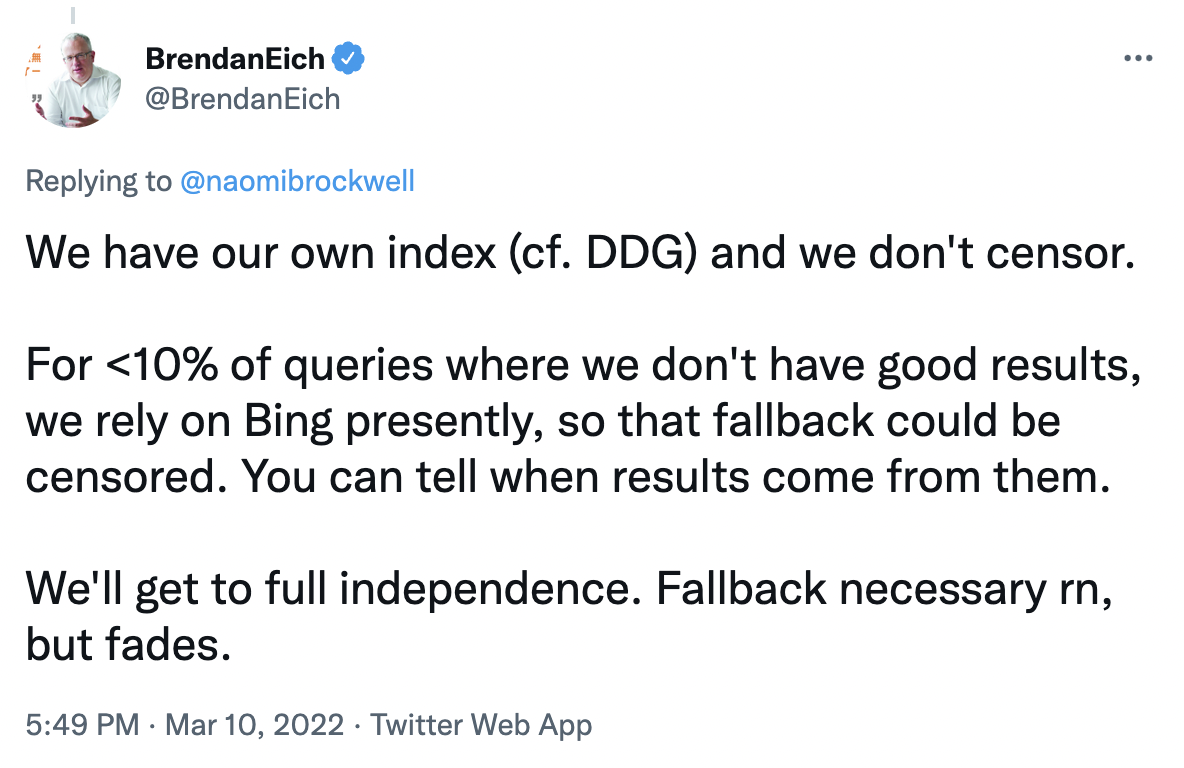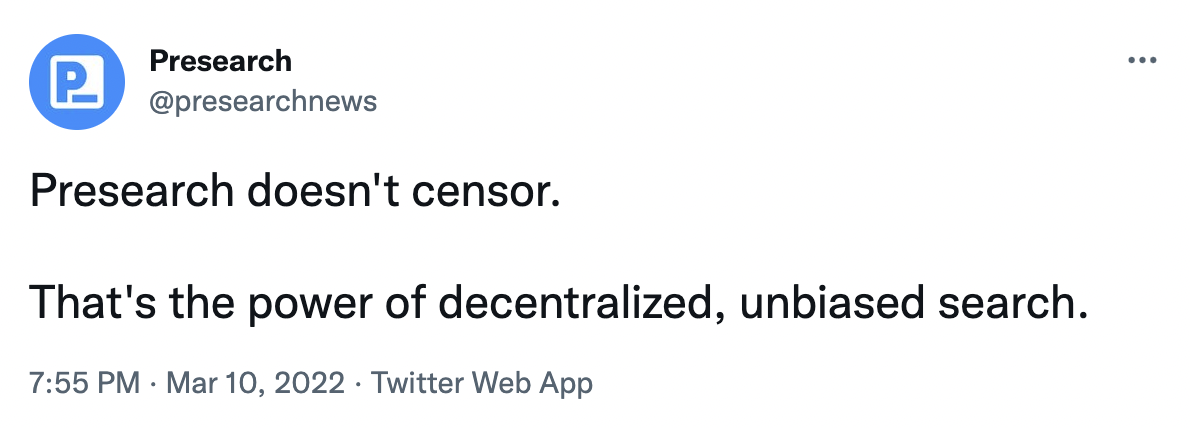Brave Search and Presearch say they don't censor search results
By victort // 2022-03-13
Tweet
Share
Copy

After DuckDuckGo announced that it would be abandoning its years-long commitment to “unbiased” search results by down-ranking “Russian disinformation,” two alternative search engines, Brave Search and Presearch, have committed to not censoring their search results.
(Article by Tom Parker republished from ReclaimTheNet.org)
Brendan Eich, the CEO of Brave Software (the company behind the privacy-focused Brave browser, Brave Search, and other products), told journalist and producer Naomi Brockwell that Brave Search doesn’t censor its results and detailed how Brave Search is expanding its own search index.
Currently, over 90% of Brave Search’s queries are provided by its independent search index which was built from scratch. Eich noted that Brave Search currently relies on Bing for the less than 10% of queries where it doesn’t have good results and acknowledged that this fallback “could be censored.”
“We’ll get to full independence,” Eich added. “Fallback necessary rn, but fades.”
 Eich continued by noting that Brave Search has an “Info” link above each search results page (which shows whether all the search results on the page came from the Brave Search index) and a “Search results independence” percentage in Brave Search’s settings (which shows the percentage of all Brave Search results that currently come from its independent index).
Eich continued by noting that Brave Search has an “Info” link above each search results page (which shows whether all the search results on the page came from the Brave Search index) and a “Search results independence” percentage in Brave Search’s settings (which shows the percentage of all Brave Search results that currently come from its independent index).


 Presearch, a private, decentralized, blockchain-powered search engine, also tweeted that it “doesn’t censor.”
Presearch added: “That’s the power of decentralized, unbiased search. The need for decentralized, unbiased search will only grow from here.”
Presearch, a private, decentralized, blockchain-powered search engine, also tweeted that it “doesn’t censor.”
Presearch added: “That’s the power of decentralized, unbiased search. The need for decentralized, unbiased search will only grow from here.”

 As Presearch notes in its tweets, its search indexes are built and hosted by a decentralized network of node operators. It’s also open-source which means users can contribute code that’s shown its search results pages.
In addition to the commitment to not censoring their results, both search engines have several unique aspects and features that enhance your search experience.
Brave Search has search shortcuts (which let you quickly jump to search results on a specific site), visual autosuggest, search filters (that let you filter by format, date, country, and more), featured snippets, and shelves that highlight recent news and videos.
Presearch has an integrated PRE cryptocurrency that’s used to reward node operators and users and can be staked by advertisers who want to display ads against specific keywords. It also has knowledge panels, a news shelf, a video shelf, quick links to related articles and related searches, search filters (that let you filter by image, video, or news), and quick links for conducting your searches via other sites.
Read more at: ReclaimTheNet.org
As Presearch notes in its tweets, its search indexes are built and hosted by a decentralized network of node operators. It’s also open-source which means users can contribute code that’s shown its search results pages.
In addition to the commitment to not censoring their results, both search engines have several unique aspects and features that enhance your search experience.
Brave Search has search shortcuts (which let you quickly jump to search results on a specific site), visual autosuggest, search filters (that let you filter by format, date, country, and more), featured snippets, and shelves that highlight recent news and videos.
Presearch has an integrated PRE cryptocurrency that’s used to reward node operators and users and can be staked by advertisers who want to display ads against specific keywords. It also has knowledge panels, a news shelf, a video shelf, quick links to related articles and related searches, search filters (that let you filter by image, video, or news), and quick links for conducting your searches via other sites.
Read more at: ReclaimTheNet.org
 Eich continued by noting that Brave Search has an “Info” link above each search results page (which shows whether all the search results on the page came from the Brave Search index) and a “Search results independence” percentage in Brave Search’s settings (which shows the percentage of all Brave Search results that currently come from its independent index).
Eich continued by noting that Brave Search has an “Info” link above each search results page (which shows whether all the search results on the page came from the Brave Search index) and a “Search results independence” percentage in Brave Search’s settings (which shows the percentage of all Brave Search results that currently come from its independent index).


 Presearch, a private, decentralized, blockchain-powered search engine, also tweeted that it “doesn’t censor.”
Presearch added: “That’s the power of decentralized, unbiased search. The need for decentralized, unbiased search will only grow from here.”
Presearch, a private, decentralized, blockchain-powered search engine, also tweeted that it “doesn’t censor.”
Presearch added: “That’s the power of decentralized, unbiased search. The need for decentralized, unbiased search will only grow from here.”

 As Presearch notes in its tweets, its search indexes are built and hosted by a decentralized network of node operators. It’s also open-source which means users can contribute code that’s shown its search results pages.
In addition to the commitment to not censoring their results, both search engines have several unique aspects and features that enhance your search experience.
Brave Search has search shortcuts (which let you quickly jump to search results on a specific site), visual autosuggest, search filters (that let you filter by format, date, country, and more), featured snippets, and shelves that highlight recent news and videos.
Presearch has an integrated PRE cryptocurrency that’s used to reward node operators and users and can be staked by advertisers who want to display ads against specific keywords. It also has knowledge panels, a news shelf, a video shelf, quick links to related articles and related searches, search filters (that let you filter by image, video, or news), and quick links for conducting your searches via other sites.
Read more at: ReclaimTheNet.org
As Presearch notes in its tweets, its search indexes are built and hosted by a decentralized network of node operators. It’s also open-source which means users can contribute code that’s shown its search results pages.
In addition to the commitment to not censoring their results, both search engines have several unique aspects and features that enhance your search experience.
Brave Search has search shortcuts (which let you quickly jump to search results on a specific site), visual autosuggest, search filters (that let you filter by format, date, country, and more), featured snippets, and shelves that highlight recent news and videos.
Presearch has an integrated PRE cryptocurrency that’s used to reward node operators and users and can be staked by advertisers who want to display ads against specific keywords. It also has knowledge panels, a news shelf, a video shelf, quick links to related articles and related searches, search filters (that let you filter by image, video, or news), and quick links for conducting your searches via other sites.
Read more at: ReclaimTheNet.org
Tweet
Share
Copy
Tagged Under:
glitch mainstream media censorship banned tech giants censored Big Tech conservative media Brave Search Presearch
You Might Also Like
“Fact-checkers” give high rankings to fake news outlets that covered for Hunter Biden
By Ethan Huff // Share
Android messages and dialer apps quietly send data to Google, report alleges
By News Editors // Share
Ukraine’s digital government services app converted into an instrument of war
By Mary Villareal // Share
Recent News
A community reels: Deadly dorm shooting strikes South Carolina State University
By willowt // Share
The Body Electric: A revolutionary blueprint for human health and freedom
By bellecarter // Share
Senate Democrats block military funding bill as shutdown crisis deepens
By patricklewis // Share
Trump orders Pentagon to boost coal power purchases
By lauraharris // Share











